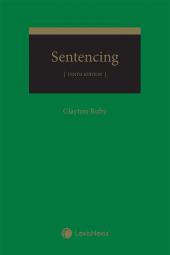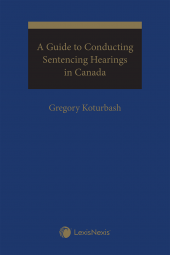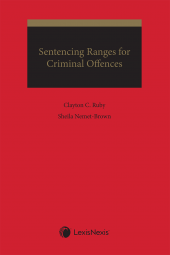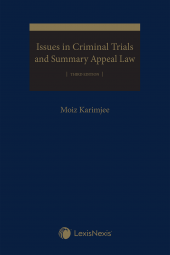Sentencing, 10th Edition
One Year Subscription Only Terms
Subscribers receive the product(s) listed on the Order Form and any Updates made available during the annual subscription period. Shipping and handling fees are not included in the annual price.
Subscribers are advised of the number of Updates that were made to the particular publication the prior year. The number of Updates may vary due to developments in the law and other publishing issues, but subscribers may use this as a rough estimate of future shipments. Subscribers may call Customer Support at 800-833-9844 for additional information.
Subscribers may cancel this subscription by: calling Customer Support at 800-833-9844; emailing customer.support@lexisnexis.com; or returning the invoice marked 'CANCEL'.
If subscribers cancel within 30 days after the product is ordered or received and return the product at their expense, then they will receive a full credit of the price for the annual subscription.
If subscribers cancel between 31 and 60 days after the invoice date and return the product at their expense, then they will receive a 5/6th credit of the price for the annual subscription. No credit will be given for cancellations more than 60 days after the invoice date. To receive any credit, subscriber must return all product(s) shipped during the year at their expense within the applicable cancellation period listed above.
Détails des produits
Click here for the Student Edition of Sentencing, 10th Edition.
Recently cited by the Supreme Court of Canada in R. v. Parranto, [2021] S.C.J. No. 46.
An Authoritative Guide on All Relevant Aspects of Sentencing
For over 30 years, this book has set forth sentencing principles and analyses in order to help criminal defence lawyers formulate effective submissions to sentencing judges. Sentencing, regarded by many as "the sentencing bible", canvasses the law of sentencing in a way that no other books on criminal law and sentencing are able: it succinctly outlines all of the significant facets of sentencing principles and procedure, and provides the reader with a comprehensive range of sentencing for various offences.
Highlights of This Book
- Clayton Ruby's commentary is indispensable for criminal defence lawyers in navigating the complexities of sentencing law and procedure, and in formulating appropriate sentencing submissions
- A "Range of Sentence" compilation serves as an invaluable resource for establishing sentencing ranges
- Includes an appendix on sentencing statistics which offers a bird's-eye view of the dispositions and demographics of criminal offenders across Canada
What’s New in This Edition
- Discussion of systemic racism issues with regards to sentencing
- Significant revisions concerning mandatory and optional conditions in a probation order
- Discussion of the impact of COVID-19 on sentencing decisions
- Discussion of the 2019 amendment to the Criminal Code to add s. 718.01, requiring the court to consider the aggravating impact of domestic abuse
- Extensive discussion of new cases, including Sharma, [2020] O.J. No. 3183, 2020 ONCA 478, wherein the Ontario Court of Appeal finds that sentencing provisions prohibiting conditional sentences for certain offences violates the Charter rights of Indigenous persons and strikes down those provisions
- Discussion of the requirement imposed by Friesen to recognize the serious impact of sexual offences against children
- Impact of the Supreme Court of Canada’s decision in Suter, [2018] S.C.J. No. 34, [2018] 2 S.C.R. 496 with respect to the impact of collateral circumstances and what constitutes a mistake of law
- Impact of the Supreme Court of Canada’s decision in Boudreault, [2018] S.C.J. No. 58, [2018] 3 S.C.R. 599 in striking down the mandatory fine surcharge
- Discussion of the Boutilier, [2017] S.C.J. No. 64, 2017 SCC 64, wherein the Supreme Court of Canada emphasizes that the 2008 amendment did not broaden the pool of offenders who could properly be designated as dangerous, and clarifies that judges must consider the offender's treatment prospects at the designation stage
- Addition of Zora, [2020] SCJ No 14, 2020 SCC 14 (S.C.C.), wherein the Supreme Court of Canada discusses the problematic nature of offences involving breaches of court orders
- Repeal of the Curative Discharge provision for drinking and driving offences in 2018 noted
- Extensive discussion of sentencing cases relating to sentencing for trafficking and other offences in relation to fentanyl
- Revision to recognize the legalization of marijuana and amendments to the impaired driving provisions
Who Should Read This Book
- Criminal defence lawyers – offers possible sentence ranges, which helps in determining the advice to the client and conduct of the case, preparation for sentencing, and formulating possible avenues for a sentencing appeal
- Judges – assists in determining sentence range and ensuring that sentences are appropriate
- Crown counsel – helps in formulating appropriate sentencing recommendations
- Law libraries – an authoritative guide and invaluable research tool on sentencing in Canada
Table des matières
Chapter 1: General Principles of Sentencing
Chapter 2: Finding an Appropriate Sentence
Chapter 3: Procedure
Chapter 4: Appeals
Chapter 5: Aggravating and Mitigating Circumstances
Chapter 6: Matters That Are Not Taken Into Consideration of Sentencing
Chapter 7: Mandatory Minimum Penalties and the Charter
Chapter 8: Criminal Record
Chapter 9: Discharge
Chapter 10: Suspended Sentence and Probation
Chapter 11: The Fine
Chapter 12: Corporate Crime
Chapter 13: Imprisonment
Chapter 14: Consecutive and Concurrent Sentences
Chapter 15: Conditional Sentencing
Chapter 16: Parole
Chapter 17: Dangerous and Long-Term Offenders
Chapter 18: Sentencing the Aboriginal or Black Offender
Chapter 19: The Victim of Crime
Chapter 20: Orders
Chapter 21: Costs
Chapter 22: Sentencing under the Youth Criminal Justice Act
Chapter 23: Range of Sentence
Appendix: Sentencing Statistics
 Lexis Nexis
Lexis Nexis 


